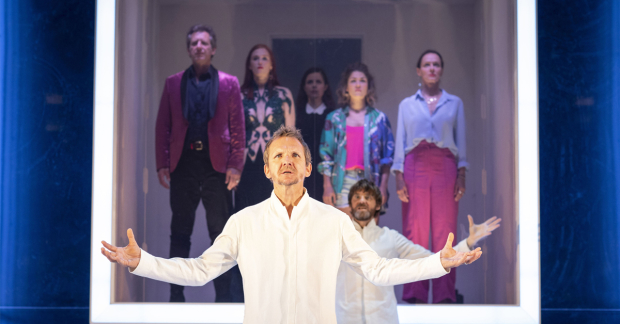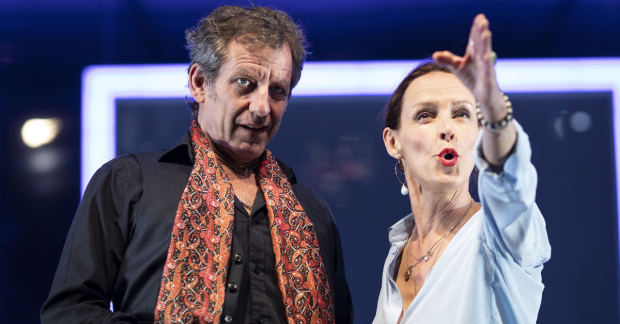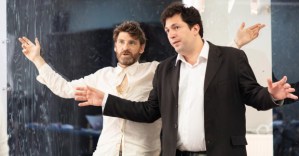Did the critics scream sacré bleu at dual-language Tartuffe?
Paul Anderson stars in Christopher Hampton’s modern-day adaptation of Molière’s comedy

© Helen Maybanks
Matt Trueman, WhatsOnStage
★★
"Relocated to Donald Trump's duplicitous America, Tartuffe becomes a latterday evangelical… He speaks with a sing-song Southern accent, and walks on with bare feet, gripping his rosary beads like a thug's bicycle chain…"
"However, in relying so fully on physicality, French director Gérald Garutti's staging lays everything up-front, obliterating subtext and subtlety in the process."
"Garutti's English actors aren't comfortable with the physicality, his French cast (Roché excepted) mangle the words. Being bilingual makes it a difficult watch, practically speaking, as your brain's forced to flick between registers. Just as you tune into one language, the speakers switch and you're sent scrabbling for surtitles."
"Hampton's both faithful to Molière, and specific to Trump. But the two cancel each other out in Garutti's abstracted staging… It's never more confused than when Trump himself drops in at the end – a Donald-ex-machina – and saves the day with a glibly satirical speech showing off his hypocrisy. Or is it impostering?"
Sam Marlowe, The Times
★
"…Garutti's production has next to nothing to say about the state of the union, and the switches between languages appear pretty arbitrary. The acting is mechanical, and while Audrey Fleurot (Spiral) and Paul Anderson (Peaky Blinders) sprinkle some glamour, they're no less awkward than their castmates."
"Andrew D Edwards's design is an abomination, a gimmicky attempt at chic that works against play and performers, destroying whatever slim chance the whole debacle had of being remotely watchable."
"A key scene in which Tartuffe attempts to seduce her escalates into sexual assault — an ugly, unearned moment, later dismissed with a lame joke about grabbing pussies."
"Somewhere in this pretentious shambles is perhaps a vague allusion to the rise of religious and political conservatism, or our willingness to put our faith in self-interested demagogues. Perhaps. Who cares? This is such spectacularly bad theatre that it had me praying — please, please, just make it stop."

© Helen Maybanks
Michael Billington, Guardian
★★
"On paper, it might have seemed like a good idea. In practice, this bilingual version of Molière's great comedy, played in both French and English, proves erratic and confusing."
"The production also raises, without answering, the old question of what Molière's play is really about. Is Tartuffe a hypocrite or does he hold a sincere religious belief? For all Anderson's bearded gravitas, I was never quite sure whether he was meant to be taken as a moralist or a charlatan."
"Hampton's adaptation also makes a good joke out of the deus ex machina in which Orgon's problems are resolved by an emissary from a truth-loving American president. But it's a long time to wait for the biggest laugh of the evening."
"There is a lack of coherence about a bilingual production that will, I suspect, fail to satisfy either native French-speakers or dedicated Anglophones."
Henry Hitchings, Evening Standard
★★
"Seventeenth-century French comedies don't exactly swamp the London stage, but Molière's satire on religious hypocrisy has the potential to be a crowd-pleaser."
"[Paul] Anderson sustains an air of evangelical weirdness and [Audrey] Fleurot captures Elmire's strategic watchfulness, yet it's Sebastian Roché as the pathetically enthusiastic Orgon who makes the strongest impression."
"Gérald Garutti's staging never settles decisively on a particular tone. Its depiction of LA decadence is vague, the humour is erratic, and the moments of political seriousness are clunky, especially when the now almost obligatory reference to Donald Trump is introduced with all the subtlety of a charging rhino."
"This is a Tartuffe that flickers with promise, yet manages to take risks without achieving a blazing irreverence."
Natasha Tripney, The Stage
★★
"The play shifts backwards and forwards between French Alexandrine metre and English blank verse in a way that is often disjointed."
"Andrew D Edwards' set, consisting of a glossy box fronted with privacy glass, lit in neon shades and surrounded by what appears to be an infinity pool, looks sleek, but it just adds to the sense of disconnection. When the actors are inside the box it distorts their voices and makes it harder to appreciate what's going on."
"It ends up feeling both clinical and clunky, something not helped by the cast spending an awful lot of the first half hopping on and off a large green sofa. No one, Tom Cruise aside, has ever interacted with furniture in this way."
"The Trump references that conclude the production draw big laughs but they're delivered with boxing-glove subtlety and feel out of keeping with what has gone before."

© Helen Maybanks
Tom Wicker, Time Out
★★
"The American setting is scaffolding for a White House-invoking final act that pays lip service to the original play's suspiciously hyperbolic praise of King Louis XIV. It's undeniably fun, but in a fast-food way: a rush of empty calories that ultimately leaves you unfulfilled and a little greasy. It packs in headlines, while actually saying nothing new."
"There's something inherently interesting in the dual-language nature of Gerald Garutti's production: ‘America First' welcomes foreigners with open arms, if they're wealthy. But it's a poor staging of the play."
"Perhaps the biggest problem, though, is that this production – caught up in the reflection of its shiny surfaces – isn't particularly funny. The humour is often clumsy in the performance."
"There's potential for some serious satirical savagery here. Tonally, though, this production is a mess, lurching between gurning and ominousness."
"Fleurot still manages to bring a reality to Elmire's predicament; as Dorine, Claude Perron enjoyably bubbles over with frustration at the inanity surrounding her… and a buffoonish Sebastian Roche is at least appropriately ridiculous as the credulous millionaire."
Paul Taylor The Independent
★★★
"I wish that Hampton had given us a complete Trump-era makeover of the play. I would be interested to see how it would cope with the fact that that Evangelical Christianity seems prepared to forgive Trump for any of his scandals, sexual or otherwise. Hypocrisy seems to have been deconstructed out of existence in our post-truth world."
"As it is, the updating is mostly confined to tweaks here – until the final ten minutes when there's a sudden avalanche of Trump. Moliere's play, originally banned, famously had to wait five years to be licensed for public performance by the King. I think that Hampton is right in seeing the fulsome flattery of the monarch in the Officer's speech at the end as "actually criticism in the form of praise", as he has commented."
"With the family planning a trip to Mar-a-Lago as another Tartuffe ominously arises, this could be called a case of too much, too late."



















